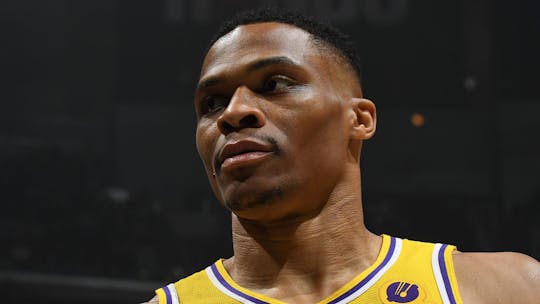LOS ANGELES — After he strutted into the room, Russell Westbrook showed two of the unmistakable traits that have marked his NBA career.
Westbrook showed off his fashion sense, sporting a bright, open-buttoned shirt as if he were walking down a fashion runway than sitting down for a postgame news conference.
Westbrook also displayed his defiance. A reporter suggested Westbrook could not have envisioned the Lakers’ turbulent season — one that included Thursday’s 132-111 loss to the LA Clippers and marked the Lakers’ fourth straight loss. Then, Westbrook fired back with the same kind of feistiness he often shows to an opponent or a call that annoys him.
“I had no expectations. That’s why you don’t know what I envisioned,” Westbrook said. “I come into every situation the same. Last four years, I’ve been on different teams four times. My vision of thinking everything would be peaches and cream, that’s not realistic. That’s not life. For me, I come in every situation starting from ground zero and trying to figure it out the right way.”
Westbrook’s explanation highlighted two things.
The first part? Westbrook offered a misleading explanation that borders on revisionist history. After the Lakers acquired Westbrook from the Washington Wizards last offseason, Westbrook surely had some uncertainty on how the season would play out or how exactly he would co-exist with LeBron James and Anthony Davis. But make no mistake: Westbrook came to the Lakers with high expectations.
Consider his actual words in his introductory press conference.
“AD and LeBron are friends of mine first,” Westbrook said then. “Me being a teammate, it’s my job to come in and uplift them. They’ll do the same to me, and vice versa. As the season prolongs, there will be ups; there will be downs. That’s normal. That’s okay. But we’ll figure it out on how to play the best way that we want to play to win a championship.”
The second? Westbrook has not lived up to his own expectations. He has failed to uplift others, often playing his own style — one that has yielded more headaches than highlight reels. And he has certainly not lifted the Lakers to help them remain in championship contention.
Instead, Westbrook has become one of the most significant reasons why the Lakers (27-35) sit in ninth place in the Western Conference while fighting just to appear in the NBA’s Play-In Tournament.
The Lakers’ front office oversaw the building of this poorly constructed roster because they sacrificed too much depth to acquire Westbrook. They also signed too many veterans past their usefulness. And they failed to acquire players that would give the Lakers a defensive identity that became instrumental during their 2020 NBA championship run.
However, one cannot discount the Lakers’ external circumstances. They entered Wednesday’s game with players missing a combined 183 games due to injuries. They had players miss another 35 games due to COVID-19 and the league’s Health and Safety Protocols. And they have fielded 30 different starting lineups.
The Lakers also rationalized this risky move partly because Westbrook had proven during his 14-year career that he could carry teams through his sheer will, athleticism and playmaking. With the Lakers hoping to delay James’ fight against Father Time and protect Davis from further injury, they banked on Westbrook at least becoming capable of fulfilling two job descriptions. First, lighten the workload James and Davis carried. Second, revert back to a main option anytime James or Davis missed games separately or together.
Instead, the Lakers have just seen Westbrook get in his own way. Sometimes he plays like he’s driving a sports car at over 100 miles an hour on the L.A. freeway without any worry. Or, he plays like he’s driving a van below the speed limit in the passing lane.
When the Lakers tried to deal Westbrook before the trade deadline last month, they encountered a depressed market for him because of his poor play and his hefty contract (two years, $91 million). The Lakers could have only dealt Westbrook if they were willing to acquire another veteran point guard filled with question marks (such as Houston’s John Wall), while mortgaging their 2027 Draft pick.
“I’m not a quitter,” said Westbrook after Thursday’s loss. “It’s not in my genes. I don’t quit, regardless of what the hell is going on. I’m going to fight to the end. If it doesn’t work, that’s cool, too. I can live with the results. I’m never going to give up or give in because of a little struggle that’s happening at this time of the year.”
No one will question Westbrook’s competitiveness. That distinguishable trait partly explains why Westbrook is the NBA’s all-time leader in triple-doubles, is an NBA 75th Anniversary Team member and a former Kia MVP.
But even if Westbrook has mostly played hard, he has often failed to play smart. He has forced shots in traffic or passed up open shots. He has made risky passes and failed to close out on defenders. He has spent more energy showing his frustration with an official’s call than focusing on the next play.
All of which explains why Lakers coach Frank Vogel eventually decided not to feature him in crunch-lineups in three games this season. That explains Vogel’s answer when asked if he has even considered featuring Westbrook off the bench: “We’ve talked about everything.”
“We’re trying to coach the whole team,” Vogel said Thursday. “We’re trying to find solutions that are best for the team. That’s everything that we’re doing. We’re looking at all of our players in how we’re using all of them. If we’re getting down 20 [points] every night, we’re going to adjust our team.”
Westbrook presumably will not like reading or hearing that answer. Westbrook has frequently made veiled comments about Vogel’s rotations to explain his inconsistency.
“My role has changed every single night,” Westbrook said. “So, I’m trying to figure it out as I’m playing to be able to benefit and help my team.”
Westbrook has not done that, though.
Instead, Westbrook has appeared to find more satisfaction with simply returning to Los Angeles after growing up in Lawndale, attending Leuzinger High and starring at UCLA.
“I go lay down, get some rest, wake up, take my kids to school. That’s the most important thing to me — family to me,” Westbrook said. “Being around my family is the most important thing I can do. Basketball is fun, but it’s a short period of time in your life. So, I don’t stress out too much about it because my family is the most important thing in my life. So that’s the way I can decompress and have my focus elsewhere.”
He has also been proud of how he can further help the Los Angeles community with various charity initiatives.
“What gives me confidence,” Westbrook said, “is using my platform our underserved communities and our communities of color to find way to uplift them and create generational wealth for our people across Los Angeles and across the world.”
None of those priorities are bad and Westbrook deserves praise for being such a devoted husband, father and citizen. Westbrook deserves kudos for helping the L.A. community through his foundation’s support for community-based education and family-service programs. But none of those explain why the Lakers helped Westbrook return to his hometown.
They did so in hopes that Westbrook could extend their championship window.
Westbrook’s presence on the court hasn’t done that, though.
“I’ve been hearing critics since I was born,” Westbrook said with his familiar brand of defensiveness. “It’s nothing new.”
But for the Lakers, it is new. They hoped Westbrook could complement their stars and mask some roster flaws — even if those mistakes were partly self-inflicted. Instead, they have seen Westbrook remain intent on playing the game on his terms. That hardly matches how Westbrook outlined his expectations with the Lakers shortly after his arrival, nearly half a year before he said he didn’t have any.
* * *
Mark Medina is a senior writer/analyst for NBA.com. You can e-mail him here, find his archive here and follow him on Twitter.
The views on this page do not necessarily reflect the views of the NBA, its clubs or Turner Broadcasting.




